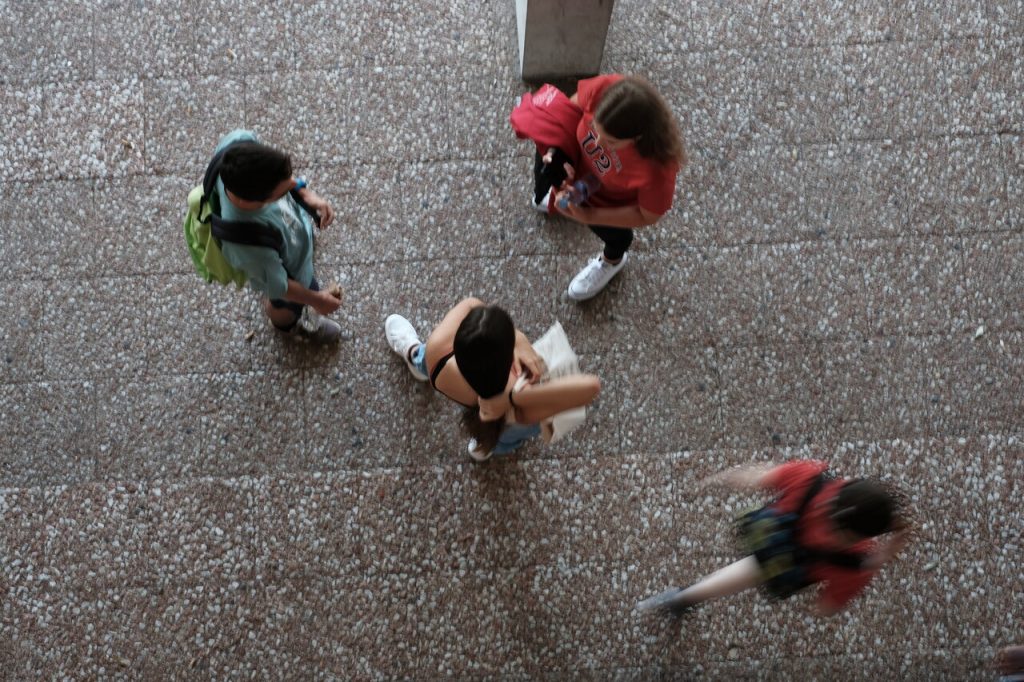18/09/2020
The URV reduces attendance at its campuses to help prevent the spread of the pandemic
All courses will be taught following a blended format and priority will be given to the face-to-face activities of first-year bachelor’s degrees

All courses will be taught following a blended format and priority will be given to the face-to-face activities of first-year bachelor’s degrees
The current rate of infections in the areas that the URV operates in and the recommendations given out by University experts have made it a priority to significantly reduce the presence of the URV’s 14,000 students and more than 2000 staff on its campuses in order to prevent the spread of the pandemic. For this reason, a resolution issued by the rector on Friday 18 September states that class attendance during the first semester will be restricted to only that which the teachers of each course consider to be essential. The resolution also regulates the conditions in which university activity will take place during the 2020-21 academic year.
More specifically, the resolution states that all the various courses offered by the URV (bachelor’s, master’s and doctoral degrees, lifelong learning and courses that lead to unofficial qualifications) must be taught in a blended format. To this end cameras have been installed in classrooms to record and livestream classes for those students who have to follow them from home. The faculties and schools must decide which teaching activities require physical attendance and priority will be given to first-year bachelor’s degree subjects (which are taught to new students) and to activities that, during the 2019-20 academic year were found to be more difficult to do online, such as clinical internships, fieldwork, laboratory work and certain types of assessment.
For students in the first year and for subjects from subsequent years, there will be theoretical classes in small groups (around 30 students), provided that the secure distance of 1.5 metres between people can be maintained and the space can be well ventilated. Students will also be able to attend classes held outside, again if social distancing can be maintained and provided that the number of students called to campus is no greater than 300.
To enable students to keep up with their classes, the resolution also states that whether they are face-to-face or online, classes should also be recorded and streamed to students so that they can follow them remotely. This will help facilitate issues such as class planning (rotation of groups), health problems or difficulties in travelling in the case of students from other parts of the country or abroad. Despite this, if there are still students who do not have the technological equipment to follow a class online and in real time, every effort will be made to prioritise them and put them in the group of students attending the class in person, provided they request this from the members of staff in charge, who will assess the circumstances. Priority will also be given to students who can provide documentary proof that they have special educational needs that make it much more advisable for them to attend in person.
The changes to teaching methodology, the training activities, assessment and the academic calendars will all be available to students via the faculty and school websites and in the Moodle environments of each subject.
Responsibility of students and staff
In order to track people who have shared spaces at a certain moment, if any case of COVID 19 is found on the premises of the URV or the Fundació URV, the professor in charge of the activity must be able to identify all of the students that participate in each group. Consequently, the University will provide a registration system using a QR code at the entrance and exit points of its classrooms and teaching spaces.
It is compulsory to use a facemask on all campuses and during all activities, and great emphasis will be placed on sufficiently ventilating spaces, hand washing and social distancing. Internships at health institutions will need to be adapted to the directives of the healthcare centre.
Furthermore, each student must accept make a sworn declaration of responsibility, which is available on Moodle, in which they agree to make themselves familiar with the Contingency Plan, which will be submitted for approval by the Governing Council on 24 September, and to comply with the personal safety measures.
Access to the premises of the URV or the Fundació URV will be denied to any individuals who have symptoms of COVID-19, who have been diagnosed with the disease and have not finished their period of self-isolation or who have been contact with someone who has symptoms of acute respiratory infection (fever, cough, difficulty breathing).
The board of each faculty/school must decide which types of teaching activity are essential
The board of each faculty/school will decide which activities have to be carried out in person, such as laboratory internships, seminars and academic tutorials, and exams and other assessment activities. Likewise, the course director or the dean’s team, with the support of the onsite logistics office, will evaluate if it is possible to do teaching activities in the open air whilst making sure that the maximum number of students is not exceeded and that the activity takes place in the proposed period.
The resolution issued on 18 September also recommends that during opening times, at least one member of the dean’s team or the board should be present to take decisions at any time regarding possible changes that need to be made due to the current situation.
All the instructions and information for the URV community regarding the changes to the normal routine of the University due to the health emergency can be found at www.urv.cat/coronavirus.
